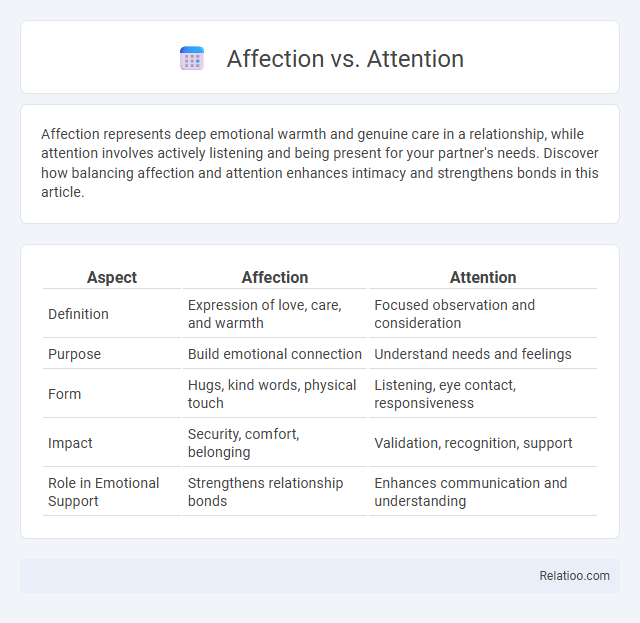Affection represents deep emotional warmth and genuine care in a relationship, while attention involves actively listening and being present for your partner's needs. Discover how balancing affection and attention enhances intimacy and strengthens bonds in this article.
Table of Comparison
| Aspect | Affection | Attention |
|---|---|---|
| Definition | Expression of love, care, and warmth | Focused observation and consideration |
| Purpose | Build emotional connection | Understand needs and feelings |
| Form | Hugs, kind words, physical touch | Listening, eye contact, responsiveness |
| Impact | Security, comfort, belonging | Validation, recognition, support |
| Role in Emotional Support | Strengthens relationship bonds | Enhances communication and understanding |
Understanding Affection and Attention
Understanding affection involves recognizing genuine emotional expressions that convey love and care, while attention refers to the act of focusing on someone's needs and presence, demonstrating consideration and engagement. Affection often manifests through physical touch, kind words, or meaningful gestures that create emotional bonds, whereas attention is exhibited by active listening and being mentally present during interactions. Your ability to differentiate these helps build stronger relationships by balancing emotional connection with mindful responsiveness.
Defining Affection in Relationships
Affection in relationships is the genuine expression of love and care through physical touch, verbal affirmations, and thoughtful actions that foster emotional closeness. Unlike mere attention, which involves noticing or focusing on a partner, affection conveys deeper feelings that strengthen bonds and create a sense of security. Warmth complements affection by providing a comforting, supportive atmosphere where both partners feel valued and emotionally connected.
What Does Attention Mean in Human Connection?
Attention in human connection refers to the focused awareness and mindful presence one offers another, signaling genuine interest and validation. It involves actively listening, observing nonverbal cues, and responding empathetically, which fosters trust and deepens relational bonds. By prioritizing attention, individuals create emotional safety and promote authentic communication essential for meaningful interactions.
Key Differences Between Affection and Attention
Affection involves expressing genuine emotional care and warmth through actions like hugs or kind words, while attention refers to focusing your mental presence or physical observation on someone or something. Affection creates emotional bonds that foster intimacy and trust, whereas attention simply denotes awareness or notice without necessarily implying emotional connection. Understanding the key differences between affection and attention helps you nurture deeper relationships by combining mindful presence with heartfelt expressions.
The Importance of Affection for Emotional Wellbeing
Affection, characterized by genuine physical and emotional expressions such as hugs, kind words, and eye contact, plays a crucial role in emotional wellbeing by fostering a sense of security and connection. Unlike attention, which involves focusing on someone's presence or actions, and warmth, which refers to an overall feeling of kindness, affection directly influences neurochemical responses, increasing oxytocin levels that reduce stress and promote happiness. Consistent affection contributes to healthy emotional development, resilience, and stronger interpersonal relationships by fulfilling fundamental human needs for love and belonging.
How Attention Impacts Relationship Satisfaction
Attention plays a crucial role in relationship satisfaction by fostering emotional connection and understanding between partners. Your ability to actively listen and respond to your partner's needs enhances trust and intimacy, which are key components of a healthy relationship. Consistent attention signals care and validation, strengthening the bond and promoting long-term relationship happiness.
Signs You Need More Affection or Attention
Recognizing signs you need more affection or attention includes feeling emotionally disconnected, craving physical touch or verbal reassurance, and experiencing loneliness despite social interactions. Your mood may decline, and you might notice increased irritability or withdrawal as signals of unmet emotional needs. Identifying these signs helps address the imbalance between affection, attention, and warmth essential for emotional well-being.
Balancing Affection and Attention in Relationships
Balancing affection and attention in relationships strengthens emotional connection and builds trust between partners. Affection involves expressing love and care through physical touch and verbal affirmations, while attention requires active listening and focused presence to understand each other's needs. Prioritizing both ensures partners feel valued and supported, fostering a healthy and resilient bond.
Common Misconceptions About Affection vs Attention
Common misconceptions about affection vs attention often confuse quantity with quality, assuming more attention always means greater affection. Affection is an emotional expression of love and care, while attention is the act of noticing or focusing on someone, which may not necessarily convey deep emotional connection. Understanding that Your loved ones need genuine warmth and affectionate gestures beyond just being noticed helps build more meaningful relationships.
Tips to Cultivate Both Affection and Attention
Cultivate affection by expressing genuine gratitude and sharing meaningful compliments that resonate emotionally, fostering deeper bonds. Enhance attention through active listening, maintaining eye contact, and eliminating distractions during interactions to show your sincere engagement with others. Your consistent focus on these practices builds a nurturing environment rich in both affection and attentive connection.

Infographic: Affection vs Attention
 relatioo.com
relatioo.com